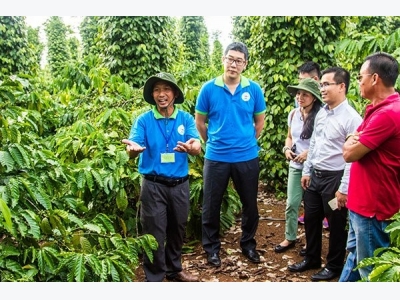Bayer offers innovative solutions to improve the efficiency of coffee production in Vietnam

Truong Hoang Trung (L), a farmer and Bayer Coffee Ambassador in Dak Lak Province, shares his experience in applying Much More Coffee solution on his field - PHOTO: BAYER VIETNAM
Ho Chi Minh City – Bayer Vietnam has contributed to the local coffee production industry by sponsoring the Coffee Symposium titled “Solutions to improve the efficiency of coffee production in Vietnam,” the first of its kind to be held in the country.
Jointly organized by the Institute of Agricultural Sciences for Southern Vietnam (IAS) and the Western Highlands Agriculture and Forestry Science Institute (WASI) last week, the Coffee Symposium aimed to address the current challenges in the area and introduce new solutions and technological advances in order to support sustainable coffee development in Vietnam, especially reforestation.
“Coffee is the second crop only to rice in the value of agricultural products exported from Vietnam. Therefore, we would like to support this area to progress further. With Much More Coffee solution and Bayer Coffee Grower Club, we aim to create a forum where key coffee growers in Vietnam can reflect and develop their professionalism and passion in the field, and eventually to help increase yields, quality and profit for coffee crops in a sustainable manner,” said Kohei Sakata, managing director of Bayer Vietnam.
The event attracted 200 participants, including representatives from the Ministry of Agriculture and Rural Development, the Ministry of Industry and Trade, Departments of Agriculture and Rural Development in the Central Highlands, scientists, research centers, finance organizations, manufacturers and processing companies of coffee for exportation locally and globally.
Dr. Tran Thanh Hung, director of IAS, said besides exporting rice and black pepper, Vietnam is the second largest producer and exporter of coffee in the world. In the 2016-2017 season, Vietnam’s coffee exports have been estimated at 27.3 million bags (60 kilos/bag), accounting for 38% to 40% of the world’s coffee exports. Only in the Central Highlands provinces up to now, the coffee acreage is over 551,670 hectares.
However, in recent years, the productivity and quality of Vietnam’s export coffee tends to be declining. In order for Vietnamese coffee trees to develop sustainably, such important key factors as coffee quality and productivity, and application of new methods are proved to be very necessary, he said.
Dr. Truong Hong, director of WASI, said the most important measures to ensure the effectiveness of reforested coffee production are certified high quality coffee varieties, systematically applying advanced technologies in irrigation and fertilization. At the same time, it is advised that coffee farmers diversify their crops in between, intercropping with suitable shading trees or such high-value fruits as avocados and durians so that the plantation could be utilized. This is also considered one of the solutions in coffee cultivation in line with climate change, helping to ensure sustainable development of the coffee industry in Vietnam.
In the context of more than 50% coffee planting areas in Vietnam is in need of re-cultivation, Bayer Vietnam has presented its Much More Coffee solution and the activity of its Bayer Coffee Grower Club to help farmers increase productivity, quality and profitability in coffee production.
The Bayer Much More Coffee solution includes recommendations of good cultivation methods and selective usage of Bayer’s fungicides during each period. This solution has been verified by WASI and the plant protection departments of Daklak and Lam Dong provinces, and also more than 1,000 models performed by coffee farmers.
In 2015, Much More Coffee solution was introduced to farmers in the Central Highlands. The performance of Much More Coffee is recorded each year, which has resulted in such impressive statistics: It helps farmers increase their productivity to 23%, saving labor cost and increasing coffee’s quality and profit up to 27% compared to normal farmer’s cultivation practices.
Related news
 Big dreams for the banana industry
Big dreams for the banana industry Though prices fluctuate all the time, in general they are on the rise, from $300 per ton in 1980s to $1,100 per ton in 2012.
 In Vietnam, imported feed material outdoes domestic produce
In Vietnam, imported feed material outdoes domestic produce Feed manufacturers in Vietnam have preferred imported material thanks to low cost and higher quality
 Vietnam ships first batch of dragon fruit to Australia
Vietnam ships first batch of dragon fruit to Australia The first batch of Vietnamese dragon fruit has been exported to Australia by the Hoang Phat one-member Ltd Co in the southern province of Long An